
by Angela Hinkle | Sep 3, 2019
Hurricane season is June 1 to November 30, with peak season in September and October. And hurricanes are not the only disasters we have to contend with. Living Well in the Panhandle provides the trusted Disaster Resources you need so you know what to do to keep your family and you living well.
Disaster Resources
Below are helpful resources for preparing for and handling the aftermath of a disaster. For more information, please contact your local UF/IFAS Extension Office.
Food Safety
Is My Food Safe to Eat?
Keeping Your Food Safe During Emergencies: Power Outages, Floods, and Fires
USDA – A Consumer’s Guide to Food Safety-Severe Storms and Hurricanes Guide
Well Water Safety
Well Water Testing
Housing
Search for an open emergency shelter near you by texting SHELTER and your zip code to 4FEMA (43362) Example: SHELTER 01234
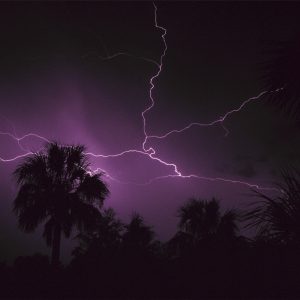
Lightning storm. Photo Source: UF/IFAS
Cleaning Up After a Hurricane
Safety Comes First!
Get the Right Tree Care Professional
Hiring an Arborist – Spanish
Cleaning Mold After a Flood
Hurricanes and Mosquitoes
Mosquito Control Tips for Homeowners
Money Management/Consumer Issues
Avoiding Fraud and Deception
Six Steps in Making an Insurance Claim
Replacing Lost or Damaged Documents
FEMA – Individual Disaster Assistance
FEMA – Interim Housing Resources
USDA Farm Service Agency Disaster Assistance
Disaster Recovery Loans
Tax Relief After a Disaster
Complaints – If you have a complaint about disaster relief assistance, contact the Department of Homeland Security’s Inspector General’s Office at 1-800-323-8603.
Family Health and Wellness
Call the Disaster Distress Helpline 24/7 for free counseling – 1-800-985-5990 (TTY) 1-800-846-8517
OR text TalkWithUs to 66746
Mental Health for Adults
Mental Health for Kids
Mental Health for Adolescents
Agriculture and Natural Resources
Practices to Minimize Flooding Damage to Commercial Vegetable Production
Florida Panhandle Agriculture
Florida Panhandle Agriculture Facebook
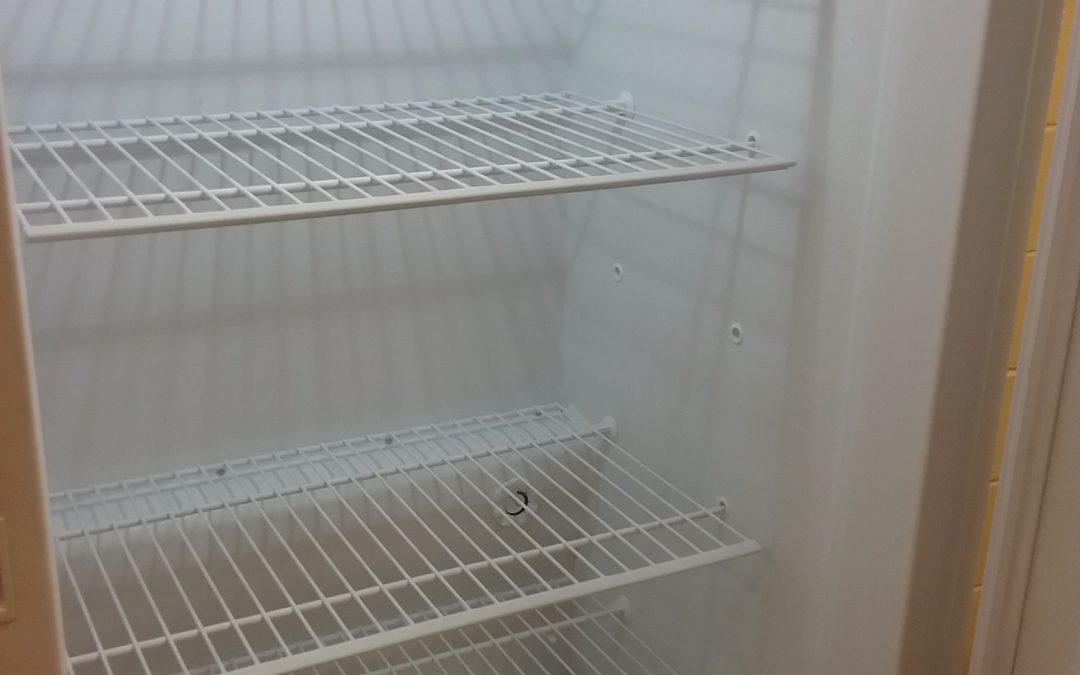
by Judy Corbus | Nov 15, 2018
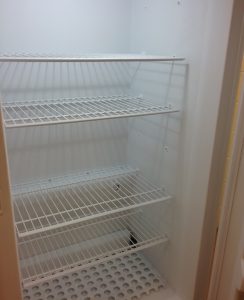
Photo source: UF/IFAS Northwest District
After an extended power outage, your refrigerator and freezer may develop unpleasant odors from spoiled food. To get rid of these odors, remove all food items and clean the inside, including drawers and bins, with a mild cleaning solution of dish soap and water. You also can use a solution of 2 tablespoons baking soda and 4 cups warm water. Strong cleansers may affect the taste of food or ice cubes or damage the interior finish. Rinse with a bleach solution of one tablespoon unscented chlorine bleach per gallon of water to sanitize. Lemon juice and water solutions are not strong enough to sanitize effectively. Leave the unit unplugged with the door open for 1-2 days to air out. Spray disinfectant around hinges, locks, and into any openings.
If odors persist, try one of these methods:
- Spread activated charcoal, clean cat litter, or baking soda on trays and place on refrigerator or freezer shelves. Activated charcoal is extra dry and absorbs odors more quickly than cooking-type charcoal. It is available at drug or pet supply stores. Run the appliance empty for 2-3 days. If the odor remains, replace with new charcoal and repeat.
- Place trays of freshly ground coffee on appliance shelves and close the door. Run the appliance empty for 2-3 days. If a slight coffee aroma remains, wash and rinse shelves and the aroma should dissipate.
- Pack each shelf with crumpled newspaper. Set a cup of water on the top shelf or sprinkle the newspaper with water. Allow appliance to run for approximately 5-6 days. While this method is time-consuming, it is effective in removing strong odors.
- Use a commercial product designed for refrigerator and freezer odor removal. These products are available at hardware, grocery, discount, and variety stores.
Once the odor is gone, rinse and dry the appliance. Don’t forget to clean gaskets with a mild cleaning solution and warm water; rinse and dry. Dirt and spills can prevent the gasket from sealing well, resulting in a loss of cold air and higher utility bills. Also, clean the coils and front grill with a brush or vacuum cleaner to remove dirt that can hinder air flow to the condenser.
Use an appliance thermometer to check the temperature of your refrigerator and freezer. The refrigerator should be between 33˚F and 40˚F and the freezer at 0 degrees or below.
If there is still an odor after trying these steps, it is possible meat or fish drippings have seeped into the insulation. An appliance service technician may need to remove the liner and replace the insulation or the appliance may need to be replaced.
Sources:
My Florida Home Book – University of Florida/IFAS Extension
Solving Odor Problems in Your Refrigerator or Freezer – University of Nebraska-Lincoln Cooperative Extension
When the Power Goes Off – Clemson Cooperative Extension
Cleaning the Fridge – North Carolina State University Cooperative Extension

by Angela Hinkle | Oct 28, 2018
You want to help but don’t know how? Maybe you don’t have much money and you don’t have skills, time, or transportation to get to hurricane Michael victims for clean up or rebuild. One easy, low-cost way to help is peanut butter.
Yes, peanut butter helps hurricane victims
Peanut butter tastes good. It is safe at room temperature – no need to refrigerate or heat. Great when there is no electricity. And it’s super easy. Spread on bread or nosh on a spoonful.
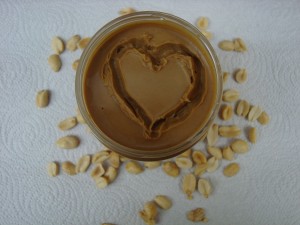
Nutty for Peanut Butter
Photo Source: Angela Hinkle
“I am so hungry. What are we going to eat?”
These words were repeated throughout affected areas of the Florida panhandle after the Michael disaster ripped through towns. Peanut butter was the answer for many. A great filler upper loaded with important protein.
The Peanut Butter Challenge
During the months of October and November, UF/IFAS Extension offices in the Florida panhandle are collecting peanut butter for the Peanut Butter Challenge. Peanut butter is dropped off at collection sites by gracious donors – like you. Then at the beginning of December, the peanut butter is distributed to hungry families in need at local food pantries. Because so many of our family, neighbors, and friends were affected by hurricane Michael, much of this peanut butter will also be headed to them this year.
Peanut Proud
Peanut Proud and others have already donated 36,000 jars of peanut butter to affected areas. While many jars will be “spread” throughout all Florida panhandle county pantries, much peanut butter will be distributed to hurricane Michael affected areas.
Gift Cards
Looking for other ways to help. Gift cards to Home Depot, Lowes, Ace, Walmart, etc. are greatly appreciated. These cards allow people to get what they need. No guesswork involved.
To find out how and where to donate as well additional recovery information, contact your local Northwest District UF/IFAS Extension office. University of Florida IFAS directory
by Samantha Kennedy | Oct 16, 2018
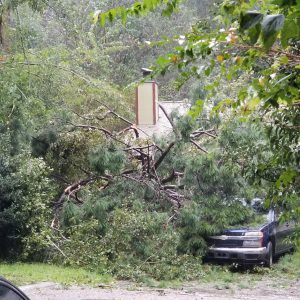
Downed trees and other debris should be handled carefully. Use proper equipment and follow all safety precautions to avoid injury. (Photo source: Samantha Kennedy)
Hurricane Michael was a storm of historic proportions, slamming into the Florida Panhandle and wreaking havoc on millions of people across the Big Bend region. Now that the storm has passed, the recovery phase has begun. Damage assessment, debris removal, structural repairs, and food safety concerns are just a few aspects of storm recovery, as people seek to rebuild their lives and return to a sense of normalcy.
There are a lot of things to think about after a disaster and it can be overwhelming. The first priority should always be basic necessities: food, water, and shelter. Make sure any structure is safe enough for habitation. If the structure’s integrity is compromised, seek alternate living arrangements.
Heed all boil water notices, if applicable. If boiling water is not possible, stick to using clean, bottled water for drinking, food preparation, and personal hygiene. Do not assume that because the food in the refrigerator is cool to the touch, that it is safe to eat. Perishable food must be kept at or below 40 degrees Fahrenheit to be considered safe. If it is uncertain as to whether that temperature was maintained while the power was out, the food should be discarded. Discard any perishable food from refrigerators after a power outage longer than 4 hours.
Be careful when assessing damage after the storm. Wear sturdy shoes and avoid wading through floodwaters. Wear a hat, sunglasses, and sunscreen when out in the sun. Drink plenty of clean water and maintain energy levels with small, nutrient-dense meals and snacks. Damaged tree limbs may continue to fall after the storm, so take heed of potential falling debris. Standing water can harbor snakes, fire ants, and other potentially dangerous critters, so take proper precautions at or around puddles or floodwater.
Use tools such as chainsaws and generators correctly and practice proper safety precautions. Do not run a generator inside and store gas cans a safe distance from both the generator and the living space. Allow others more skilled with using a chainsaw to help with debris collection and removal. If dealing with large amounts of mold, be sure to wear protective clothing and the proper respiratory mask to avoid contact with spores.
Unfortunately, many dishonest people take advantage of situations such as natural disasters to prey on those in need. Beware of people offering to help with repairs quickly and/or for an extraordinarily low price. Only hire reputable licensed contractors, even if that means having to wait for services. The Florida Department of Business and Professional Regulation myfloridalicense.com maintains a list of licensed contractors in the state of Florida. The Better Business Bureau provides ratings for a variety of businesses, including contractors. Use these resources as a guide to finding the right contractor.
Contact insurance companies as soon as possible after the storm to get the claims process rolling. Have the policy on hand when the call is made to make the process easier. It would be helpful to document any damage and have those photos available to share with the insurance agent or claims adjuster. Post-disaster is an extremely busy time for insurance companies, so be as cooperative and patient as possible during the process.
Disaster recovery is a very stressful time for everyone, often leading to confusion, anger, and helplessness. Reach out to existing support systems such as family, friends, churches, or other groups for emotional support. Practice self-care, such as regular meals and breaks. Establish a new normal routine and stick to it, especially for children. Most importantly, be kind to yourself and others during this difficult time.
The University of Florida IFAS Extension Service is a local resource for post-disaster education and assistance. More information about each of these topics and more can be provided by your local extension office.
The UF/IFAS Disaster Preparation & Recovery blog is a comprehensive resource to help with disaster recovery: http://disaster.ifas.ufl.edu/.
Extension classes are open to everyone regardless of race, creed, color, religion, age, disability, sex, sexual orientation, marital status, national origin, political opinions or affiliations.







